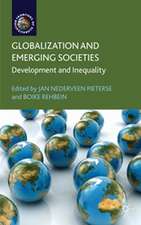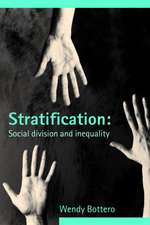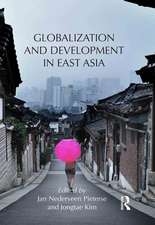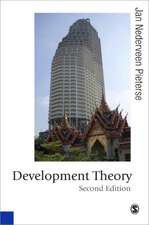Brazil Emerging: Inequality and Emancipation: Routledge Studies in Emerging Societies
Editat de Jan Nederveen Pieterse, Adalberto Cardosoen Limba Engleză Paperback – 16 sep 2015
| Toate formatele și edițiile | Preț | Express |
|---|---|---|
| Paperback (1) | 364.00 lei 6-8 săpt. | |
| Taylor & Francis – 16 sep 2015 | 364.00 lei 6-8 săpt. | |
| Hardback (1) | 1059.48 lei 6-8 săpt. | |
| Taylor & Francis – 24 sep 2013 | 1059.48 lei 6-8 săpt. |
Preț: 364.00 lei
Nou
Puncte Express: 546
Preț estimativ în valută:
69.65€ • 72.93$ • 57.77£
69.65€ • 72.93$ • 57.77£
Carte tipărită la comandă
Livrare economică 10-24 aprilie
Preluare comenzi: 021 569.72.76
Specificații
ISBN-13: 9781138952911
ISBN-10: 1138952915
Pagini: 216
Ilustrații: 8 black & white illustrations, 7 black & white tables, 3 black & white halftones, 5 black & white line drawings
Dimensiuni: 152 x 229 x 12 mm
Greutate: 0.32 kg
Ediția:1
Editura: Taylor & Francis
Colecția Routledge
Seria Routledge Studies in Emerging Societies
Locul publicării:Oxford, United Kingdom
ISBN-10: 1138952915
Pagini: 216
Ilustrații: 8 black & white illustrations, 7 black & white tables, 3 black & white halftones, 5 black & white line drawings
Dimensiuni: 152 x 229 x 12 mm
Greutate: 0.32 kg
Ediția:1
Editura: Taylor & Francis
Colecția Routledge
Seria Routledge Studies in Emerging Societies
Locul publicării:Oxford, United Kingdom
Public țintă
Postgraduate and UndergraduateCuprins
Introduction Jan Nederveen Pieterse and Adalberto Cardoso 1. Building Democracy in an Emerging Society: Challenges of the Welfare State in Brazil Sonia Fleury 2. Inequality, Poverty and the Brazilian Social Protection System Marcelo Medeiros, Sergei Soares, Pedro Souza and Rafael Osorio 3. Growth and Social Policies: Towards Inclusive Development Jan Nederveen Pieterse 4. Brazil’s Labor Market: Limitations and Opportunities for Emancipation Adalberto Cardoso 5. Social Movements and Emancipation in Brazil Ilse Scherer-Warren 6. MST’s Agenda of Emancipation: Interfaces of National Politics and Global Contestation Breno Bringel 7. Brazilian Culture as Category of Public Intervention Myrian Sepúlveda dos Santos 8. Community Policing of Rio’s Favelas: State-Led Development or Market-Oriented Intervention? Erica Mesker 9. Media Democratization in Brazil Revisited Carolina Matos 10. A Bahian Counterpoint of Sugar and Oil: Global Commodities, Global Identities? Livio Sansone 11. Why (Post)Colonialism And (De)Coloniality Are Not Enough: A Post-Imperialist Perspective Gustavo Lins Ribeiro
Recenzii
"This volume of marquee contributors enhances the conceptual and applied understanding of inequality in Brazil. Especially well edited, the book addresses the progress of social inclusion in Brazil. Summing Up: Highly recommended. Upper-division undergraduates and above." – Patrice M Franko, Colby College, CHOICE Reviews, September 2014
Descriere
Like the other so-called BRIC countries - Russia, India, China - Brazil is an emerging market of almost continental size, with multiple time zones and climate zones, from the temperate south to the tropical north. However, this volume argues that the BRIC is a deceptive category. The units are countries, but the interest is in specific economic sectors that are deemed strategic and promise high returns for investors in the global North. In contrast, this volume offers a critical inquiry into the social project and the socioeconomic realities of emerging Brazil, focusing not just on growth but on the quality of growth, on social inequality, and the frontiers of emancipation.






















